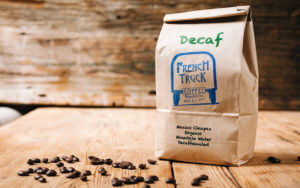Content
- 1 How decaf coffee is made
- 2 What replaces caffeine in coffee
- 3 The composition and calorie content of decaf coffee
- 4 How decaf coffee is good for
- 5 How to prepare and drink caffeine-free coffee
- 6 Harm of decaf coffee and contraindications
- 7 Can decaf coffee be used for pregnant and lactating women
- 8 Popular brands of decaffeinated coffee
- 9 Which coffee is better to choose: with or without caffeine
- 10 Conclusion
- 11 Reviews
Worldwide, 760 billion cups of coffee are consumed annually. This is one of the most popular drinks, unfortunately, not everyone can drink. The benefits and harms of decaffeinated coffee have been debated for a long time, but the findings are mixed.
How decaf coffee is made

The technology for getting rid of caffeine is called decaffeination. The substance is removed industrially, preserving the basic taste and aroma of the drink. Several technologies exist.
European way:
- grains are immersed in hot water;
- then the water is drained;
- add chemical reagents (ethyl acetate or methylene chloride);
- the caffeine dissolves, the solution is drained;
- washed with boiling water and dried.
This method effectively removes the remains of harmful components and, most often, it is he who is used in production.
Natural way
A special type of coffee tree is used, on which fruits grow, initially free from caffeine. Such varieties were found in Brazil (Cofea arabica, Coffea charrieriana). These beans differ from ordinary coffee beans in that, in the process of gene mutations, they lose their main property: instead of caffeine, they form theobromine.
Swiss charcoal filtration
- grains are immersed in very warm water (almost boiling water);
- the caffeine is removed from them;
- the grains are harvested, and the water is passed through a charcoal filter;
As a result, no caffeine remains in the coffee, while the aromatic oils remain.
There are other methods, but the ones presented here are the most popular. Thanks to decaffeination, the drink retains its basic taste properties, and the harm from its use is significantly reduced.

What replaces caffeine in coffee
The caffeine content during the decaffeinization process remains, but in such a small amount, which is comparable to the cocoa that children love (from about 2.5 to 3.5 mg), which does not have a significant effect on health.

The benefits of decaffeinated coffee also allow people who prefer a healthy lifestyle to include just such a type of drink in their daily menu without fear of harm to the body. To improve consumer properties, flavorings are added to the product.
The composition and calorie content of decaf coffee
It is considered acceptable if no more than 2.7 mg of caffeine remains in the final product.
The content of nutrients in decaf:
- 0.7 mg vitamin PP;
- 5 mg calcium;
- 7 mg phosphorus;
- 2 mg iron;
- 85 mg of potassium.
The benefits of this caffeine-free option are obvious. It contains enough useful vitamins and substances that can replenish the daily diet.
As for the calorie content, the situation here remains somewhat confusing: it can range from 0 to 1 kcal per teaspoon of the product and even rise to 15 kcal.This variation is explained by the fact that different manufacturers introduce additives and flavorings into the composition that change the properties of the energy value of the drink.
How decaf coffee is good for

The benefits of the caffeine-free option are:
- in the antioxidant properties that chlorogenic acid provides in the composition;
- improving the absorption of glucose, which helps prevent type 2 diabetes;
- minimization of the occurrence of prostate cancer - due to the large amount of trigonelline, cafeestol, quinine;
In addition, decaf coffee normalizes blood pressure.
How to prepare and drink caffeine-free coffee
Water is one of the main ingredients and must meet the following criteria:
- be transparent;
- do not have a strong unpleasant odor;
- undergo filtration - to obtain good taste.
A simple algorithm will allow you to prepare a healthy aromatic drink for yourself and your friends:
- boil water;
- add 10 g of coffee (two teaspoons) to a glass of 180 ml;
- pour boiling water;
- let it brew for 3 - 4 minutes.
Harm of decaf coffee and contraindications
Evidence-based medicine has shown no significant harm from decaf. However, there are some remarks here:
- The American Heart Association, while observing its consumption, found a significant increase in the content of free fatty acids - up to 20%, which means the risks of an increase in the level of "bad" cholesterol, the properties of which are notorious for blocking blood vessels and the development of atherosclerosis.
- Decaf is able to significantly reduce blood pressure, which can affect the deterioration of the health of hypotensive patients. And on the contrary, this property can be usefully used by hypertensive patients, subject to the restriction - no more than 1 cup per day.
- The insignificant residual of caffeine in the drink keeps contraindications for children and pregnant women.
- If a technology using solvents was used in production, the harm to health increases significantly.
- The negative effect of the caffeine-free version on the gastrointestinal tract has been proven due to the increased secretion of gastric juice and the increased harm to the development of gastritis and ulcers.
- Like regular coffee, a caffeine-free drink also influences the leaching of calcium, which can damage joints and bones.
Can decaf coffee be used for pregnant and lactating women
As for women "in position", during the normal course of pregnancy, the drink is not prohibited when consumed in a limited, controlled amount.
In case of complications of gestation, the use of even small doses of caffeine increases the possibility of provoking unpleasant consequences - up to termination of pregnancy.
It is better for a nursing mother to exclude decaf coffee altogether. Small amounts of caffeine will have a detrimental effect on the health and nervous system of the baby. Potential harm from solvent-based technologies can manifest as a threat to the infant.
Popular brands of decaffeinated coffee
Depending on preferences, you can purchase both instant and ground versions of beans in the store.
- beans: most often, it is Colombian or Ethiopian Arabica (Montana Coffee);
- ground: represented by brands: Lucaffe Decaffeinato Cafe Altura, Lavazza Green Mountain Coffee Dek Decaffeinato;
- soluble (most popular and purchased): Ambassador Platinum Nescafe Gold Decaf, Jacobs Monarch, etc.

Which coffee is better to choose: with or without caffeine
If there are health problems, then decaf is the best choice. You can lose some on the invigorating properties, but gain by reducing the harm of decaffeinated coffee for the cardiovascular system.
Decaffeinated coffee is completely contraindicated in breastfeeding, hypotension, atherosclerosis, stomach ulcers and gastritis.
In all other cases, subject to the daily requirement of 2 to 4 cups per day, the drink will bring more benefits than regular coffee.
Conclusion
The benefits and harms of decaffeinated coffee depend primarily on the state of health. Decaf is a great option that allows drink connoisseurs to reduce the risks of stress on the cardiovascular system while maintaining the taste, aroma and invigorating properties.

